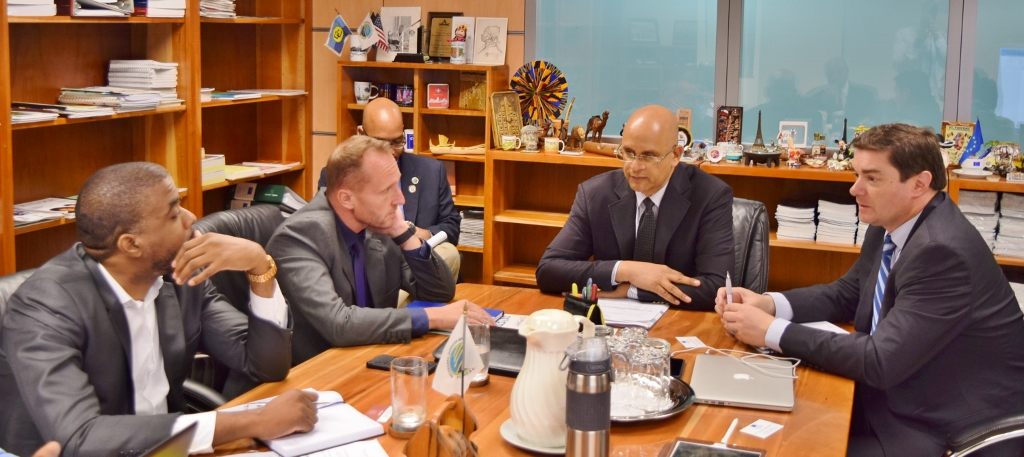National Standards Bureaux (NSBs) and other quality improvement and control-related institutions in Caribbean are to receive assistance in implementing technical barriers to trade (TBT) provisions to better comply with trade requirements as laid out by the World Trade Organisation agreements.
The initiative is funded by the TradeCom II Programme, which is an African, Caribbean and Pacific Group of States (ACP) – European Union (EU) funded project. It targets NSBs and related institutions to also help them prepare for the trade provisions of the CARIFOUM EU Economic Partnership Agreement. It is being managed by the CARICOM Regional Organisation for Standards & Quality (CROSQ), as part of the ACP/EU’s TradeCom II Programme.
At the kick-off meeting held recently in Barbados at the CROSQ’s Headquarters in Baobab Towers, Warrens, St. Michael, representatives of the European Union, CROSQ, the Barbados National Standards Institution, TradeCom II, Quarein – the technical assistance consultants, and the CROSQ Secretariat spoke about the varying benefits of the project.
CROSQ CEO, Mr. Deryck Omar noted that the activities under the project would allow quality institutions to better create a regional Good Regulatory Practices (GRP) guide “to gather and harmonize the disparate GRP knowledge across the Caribbean and also to enable Member States to cascade this guide into national GRP Codes of Practice (CoP)”.
“This ultimately will help countries in CARICOM by the adoption of a common approach to the development and implementation of technical regulations, as well as provide the grounds for a platform for formalized capacity development through training and awareness programmes,” he said. Furthermore, it is a natural complement to the CROSQ led CARICOM Regional Quality Policy (RQP) approved by the CARICOM Council of Ministers for Trade and Economic Development (COTED) in November 2017.
A new CROSQ regional TBT, Information Management Systems and Enquiry Point (TIE) Committee has also been formed to serve as technical support to the key expert of the project. Representatives are drawn from Barbados, Suriname, Trinidad and Tobago, Jamaica and St. Lucia, to name a few, along with Observer representatives from the Organisation of Eastern Caribbean States Secretariat, and the Dominican Institute for Quality, the NSB of the Dominican Republic.
Cooperation Trade Policy Manager with the EU Delegation to Barbados, CARIFORUM and the Eastern Caribbean States, Mr Adam Wisniewski expressed his pleasure at seeing yet another trade initiative forged from the TradeCom II Programme, noting that such efforts would help to bridge the gaps between the recently concluded EU-funded 10th EDF-TBT development programme, and the upcoming 11th EDF iteration.
Mr Wisniewski expressed interest in seeing the advancement of areas specifically dealing with GRPs in the preparation, adoption and application of technical regulations across the region as a means of both consumer protection and raising the standard of quality of goods produced or used within the region.
Project manager, Mr. Stephen Farquharson of CROSQ pointed out that there were many potential opportunities to be had for both governments and businesses that upheld the rules of international commitments made to the World Trade Organisation’s TBT and Sanitary and Phytosanitary Trade Facilitation Agreements, which includes reflective articles of engagement in the EPA.
Under this TradeCom II project, there will be support for developing guides for legislation; harmonised forms of documentation and the supply of data; training programmes for individuals in the TBT and regulatory areas and promotion of the activities through monitoring and support for the TIE Committee.
Mr. Farquharson also noted that this project would help governments improve their efficiency and compliance with market requirements; reduce costs of providing services; enhance communication with trade-related entities; protect consumers and aid the economic wellbeing of stakeholders. Businesses, he said, would also benefit through the simplification of procedures and legal requirements; reduction of ambiguity and dissent and the development of better communication between the border/regulatory agencies and the stakeholders.
Quarein expressed their appreciation for being given the opportunity to work on this project to further aid the development of trade and quality infrastructure projects, noting that the team looked forward to a regionally inclusive, consensus based and collaborative approach on delivering the regional GRP Guide and a sample national COP derived through the same process. There is also to be an information and educational campaign to encourage use of the documents.


